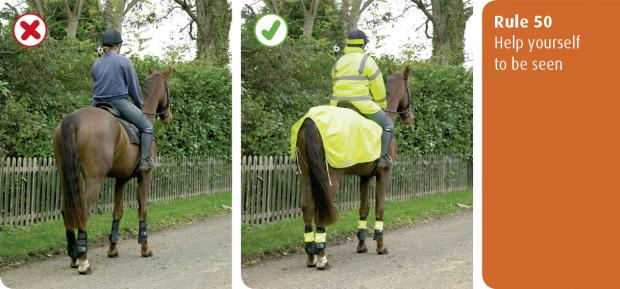Rules about animals (47 to 58)
The Highway Code for Northern Ireland's rules about animals.
Horse-drawn vehicles
47
Horse-drawn vehicles used on the road should be operated and maintained in accordance with standards set out in the Department for Transport’s Code of Practice for Horse-Drawn Vehicles. This Code lays down the requirements for a road driving assessment in Great Britain and includes a comprehensive list of safety checks to ensure that a carriage and its fittings are safe and in good working order.
48
Safety equipment and clothing. All horse drawn vehicles should have two red rear reflectors. It is safer not to drive at night but if you do, a light showing white to the front and red to the rear must be fitted.
Law RVLR reg 4
Horse riders
49. Safety equipment
Children under the age of 14 must wear a helmet which complies with the Regulations. It must be fastened securely. Other riders should also follow these requirements. These requirements do not apply to a child who is a follower of the Sikh religion while wearing a turban.
Laws H(PHYR)O Art 3 & H(PHYR)R
50. Other clothing
You should wear:
- boots or shoes with hard soles and heels
- light-coloured or fluorescent clothing in daylight
- reflective clothing if you have to ride at night or in poor visibility

51. At night
It is safer not to ride on the road at night or in poor visibility, but if you do, make sure your horse has reflective bands above the fetlock joints. A light which shows white to the front and red to the rear should be fitted, with a band, to the rider’s right arm and/or leg/ riding boot.
If you are leading a horse at night, carry a light in your right hand showing white to the front and red to the rear and wear reflective clothing on both you and your horse. It is strongly recommended that a fluorescent/ reflective tail guard is also worn by your horse.
Riding
52
Before you take a horse on to a road you should:
- ensure all tack fits well and is in good condition
- make sure you can control the horse
Always ride with other, less nervous horses if you think that your horse will be nervous of traffic. Never ride a horse without both a saddle and bridle.
53
Before riding off or turning, always look behind you to make sure it is safe, then give a clear arm signal.
When riding on the road you should:
- keep to the left
- keep both hands on the reins unless you are signalling
- keep both feet in the stirrups
- not carry another person
- not carry anything which might affect your balance or get tangled up with the reins
- keep a horse you are leading to the left
- move in the direction of the traffic flow in a one-way street
- never ride more than two abreast, and ride in single file on narrow or busy roads and when riding around bends
54
You should not take a horse on to a footway, footpath or cycle track. In Great Britain, use a bridleway where possible. In Great Britain equestrian crossings may be provided for horse riders to cross the road and you should use these where available (see Rule 27). You should dismount at level crossings where a 'Horse Rider Dismount' sign is displayed.
55
Avoid roundabouts wherever possible. If you use them you should:
- keep to your left and watch out for vehicles crossing your path to leave or join the roundabout
- signal right when riding across exits to show you are not leaving
- signal left just before you leave the roundabout
- General rules, techniques and advice for all drivers and riders (103 to 158)
Other animals
56. Dogs
Do not let a dog out on the road on its own. Keep it on a short lead when walking on the footway, footpath, road or path shared with cyclists or horse riders.
57
When in a vehicle, make sure that dogs and other animals are suitably restrained so they cannot distract you while you are driving or injure you, or themselves if you stop quickly. A seat belt harness, pet carrier, dog cage or dog guard are ways of restraining animals in cars.
58. Animals being herded
These should be kept under control at all times. You should, if possible, send another person along the road in front to warn other road users, especially at a bend or the brow of a hill. It is safer not to move animals after dark, but if you do, then wear reflective clothing and ensure that lights are carried (white at the front and red at the rear of the herd).